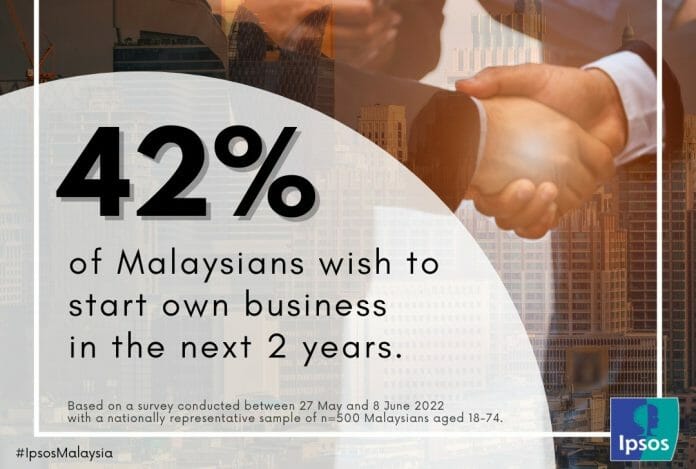Entrepreneurialism is the spawning ground for small businesses which we know help drive the health of most economies.
Small businesses took the brunt of pandemic shutdowns and are now only recovering.
So, what does the spawning ground look like now?
A new 26-country Ipsos poll finds that entrepreneurial activity is alive and well in some countries but lacking in others.
Overall, almost three-in-ten global citizens (31%) say that they have started a business at some point, while close to an equal number (29%) hope to do so in the near future.
But entrepreneurial activity and aspirations vary widely by country.
Government support seen as key
When asked how much inflation, interest rates and government support contribute to the success of new business endeavours, government supports ranks first (56%), interest rates second (50%) and inflation third (40%).
But only close to one-third (30%), on average across 28 countries, say that government is doing a good job fostering entrepreneurialism in their countries.
The private sector and banks do not fare any better.
Only a minority say that the private sector (31%) and banks (31%) are doing a good job fostering entrepreneurialism in their countries.
Non-traditional groups becoming active
While entrepreneurialism may have been the domain of men and higher socio-economic groups in the past, this is no longer the case.
The findings show people who identify as women (+5%), Gen Z/Millennial (+18%) and lower income (+7%) have increased most since 2018 in reporting that they have started a business.
The biggest increase in entrepreneurial aspirations since 2018 is among women, Gen Z/Millennials, those with lower education and people of lower and middle income.
Funding holding people back
When asked what the key barriers are to starting a business, funding ranks as the top barrier (41%).
Lack of interest (19%) and the condition of the economy (19%) rank well back tied in second place,
while lack of knowledge (17%) is close behind.
Women not treated fairly
Just under 2 in 5 global citizens (37%) believe that women are treated fairly when they try to start a business.
This varies widely by country with a majority in China (67%), India (60%) and Malaysia (55%) believing women are treated fairly.
This belief is lowest in Italy (26%), France (26%), Brazil (25%), South Korea (24%) and Japan (14%).
The bottom line
The Ipsos entrepreneurialism study shows that there is significant untapped potential for entrepreneurial activity moving further into 2022 and beyond.
And key to tapping this potential is recognising that traditionally underrepresented groups, like women, those with lower education and those with lower incomes, are catching up with traditional groups, such as men, in their entrepreneurial aspirations.
About the study
These are the findings of a 26-country Ipsos survey conducted May 27-June 7, 2022, among 21,515 adults aged 18-74 in the United States, Canada, Malaysia, South Africa and Turkey, and among people ages 16-74 in 23 other countries, via Ipsos’ Global Advisor online survey platform.
Each country’s sample consists of ca. 1,000 individuals in each of Australia, Brazil, Canada, China (mainland), France, Germany, Great Britain, Italy, Japan, Spain and the United States, and ca. 500 individuals in each of Argentina, Belgium, Chile, Colombia, Hungary, India, Malaysia, Mexico the Netherlands, Peru, Poland, South Africa, South Korea, Sweden, Switzerland and Turkey.









